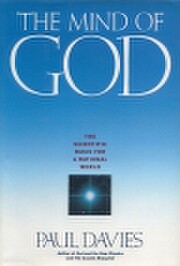|
|
Loading... Mind of God: Scientific Basic for a Rational World (original 1992; edition 1992)| 1,306 | 8 | 15,698 |  (3.86)
(3.86) | 11 | Throughout history, humans have dreamed of knowing the reason for the existence of the universe. In The Mind of God, physicist Paul Davies explores whether modern science can provide the key that will unlock this last secret. In his quest for an ultimate explanation, Davies reexamines the great questions that have preoccupied humankind for millennia, and in the process explores, among other topics, the origin and evolution of the cosmos, the nature of life and consciousness, and the claim that our universe is a kind of gigantic computer. Charting the ways in which the theories of such scientists as Newton, Einstein, and more recently Stephen Hawking and Richard Feynman have altered our conception of the physical universe. Davies puts these scientists' discoveries into context with the writings of philosophers such as Plato. Descartes, Hume, and Kant. His startling conclusion is that the universe is "no minor byproduct of mindless, purposeless forces. We are truly meant to be here." By the means of science, we can truly see into the mind of God.… (more) |
▾Book information ▾LibraryThing Recommendations ▾Will you like it?
Loading...
 Sign up for LibraryThing to find out whether you'll like this book. ▾Conversations (About links) No current Talk conversations about this book. » See also 11 mentions ▾Series and work relationships Belongs to Publisher Series
|
|
| Canonical title |
|
| Original title |
|
| Alternative titles |
|
| Original publication date |
|
| People/Characters |
|
| Important places |
|
| Important events |
|
| Related movies |
|
| Epigraph |
|
| Dedication |
|
| First words |
|
| Quotations |
|
| Last words |
|
| Disambiguation notice |
|
| Publisher's editors |
|
| Blurbers |
|
| Original language |
|
| Canonical DDC/MDS |
|
| Canonical LCC |
|
▾References References to this work on external resources.  Wikipedia in English Wikipedia in English
None ▾Book descriptions Throughout history, humans have dreamed of knowing the reason for the existence of the universe. In The Mind of God, physicist Paul Davies explores whether modern science can provide the key that will unlock this last secret. In his quest for an ultimate explanation, Davies reexamines the great questions that have preoccupied humankind for millennia, and in the process explores, among other topics, the origin and evolution of the cosmos, the nature of life and consciousness, and the claim that our universe is a kind of gigantic computer. Charting the ways in which the theories of such scientists as Newton, Einstein, and more recently Stephen Hawking and Richard Feynman have altered our conception of the physical universe. Davies puts these scientists' discoveries into context with the writings of philosophers such as Plato. Descartes, Hume, and Kant. His startling conclusion is that the universe is "no minor byproduct of mindless, purposeless forces. We are truly meant to be here." By the means of science, we can truly see into the mind of God. ▾Library descriptions No library descriptions found. ▾LibraryThing members' description
| Book description |
"Faccio parte di quel gruppo di scienziati che non professa nessuna religione tradizionale, ma, nonostante ciò, nega che l'Universo sia qualcosa di accidentale, senza uno scopo. Attraverso il mio lavoro scientifico sono giunto a credere sempre più fermamente che l'Universo fisico è costituito con un'ingegnosità così sorprendente che non riesco a considerarlo meramente come un fatto puro e semplice. Mi pare che ci debba essere un livello più profondo di spiegazione. Se si desidera chiamare tale livello "Dio" è una questione di gusto e di definizione. Sono, inoltre, giunto alla conclusione che la mente - ossia la nostra coscienza consapevole del mondo - non è un carattere insensato e fortuito della natura, ma un aspetto assolutamente fondamentale della realtà. Questo non vuole dire che noi siamo il fine per cui esiste l'Universo. Lungi da ciò. Credo, però, che noi esseri umani siamo una parte essenziale dell'organizzazione del mondo. Nelle pagine che seguono cercherò di esporre le ragioni di tali convinzioni. Ed esaminerò anche alcune teorie e convinzioni di altri scienziati e teologi, non tutte concordi con le mie. Gran parte della discussione riguarda nuovi progressi sulle frontiere della scienza, alcuni dei quali hanno condotto a idee interessanti ed entusiasmanti su Dio, la creazione e la natura della realtà. Questo libro non vuole, comunque, essere un racconto esaustivo dell'interfaccia scienza/religione, ma piuttosto una ricerca personale finalizzata alla comprensione" (Paul Davies). Le origini dell'Universo, il tempo, persino il senso della vita umana sulla Terra: sempre più la scienza moderna sfiora questioni che tradizionalmente appartenevano alla sfera religiosa. Lo scienziato Paul Davies spiega con la semplicità del grande divulgatore come siamo giunti a intravedere quella che, a seconda delle nostre convinzioni, possiamo definire "teoria generale dell'Universo" o "la mente di Dio"
(piopas)  | |
|
|
Current DiscussionsNone Google Books Google Books — Loading... Swap (2 have, 8 want) Swap (2 have, 8 want) |



 Google Books — Loading...
Google Books — Loading... (3.86)
(3.86)
Con questi pensieri l'Autore conclude il suo pregevole libro. Io, che non sono uno scienziato, ma sono soltanto un semplice lettore. Concedo allo scienziato Paul Davies la possibilità di pensare all'esistenza di Dio e che questi abbia poi anche una sua "mente" alla quale è lecito rivolgere una semplice, banale domanda, e chiedo: ma se Lui, Dio, è la Mente di tutto, che ragione, motivo aveva di creare un soggetto chiamato Uomo, così come Lui stesso l'ha concepito, e gli ha permesso di nascere ed esistere senza che potesse avere la possibilità di darsi una risposta? Un Uomo capace sì di dare una risposta ai primi quattro interrogativi chi-cosa-quando-dove? ma incapace di rispondere all'ultimo, perchè?
(